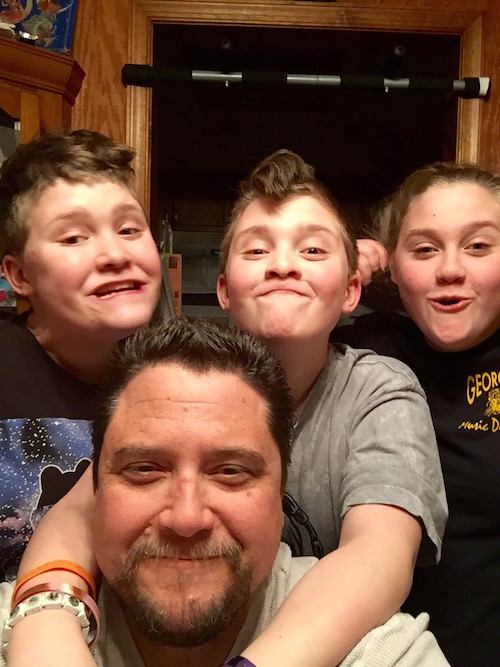Build Union. Buy American. Save a Life. That’s the message on display each day to six lanes of traffic outside Wilmington, Del., Local 313’s union hall, where the local is using the high-visibility marquee to help an IBEW brother find a desperately-needed kidney donor.

|
| Dave Amalfitano with his three children, Matthew and Leo, 11, and Anna, 14.
|
Dave Amalfitano, 46, approached Business Manager Douglas
Drummond in April about using the sign to advertise his condition, hoping the
extra attention might finally connect him with someone willing and able to
change his life. “Saying ‘yes’ was one of the easiest decisions I’ve had to
make in this job,” Drummond said.
Amalfitano, an inside wireman and
single father of three, suffers from polycystic kidney disease, or PKD, a
genetic disorder that causes the kidneys to develop cysts and grow many times
their normal size, usually necessitating their replacement. In extreme cases,
PKD-afflicted kidneys have grown to a massive 25 pounds.
“My father died a few years ago
from this disease after years of dialysis, and my brother has it too,”
Amalfitano said. “This effort to find a donor is just part of my fight to make
sure I’m around for my kids.”
While Amalfitano has been dealing
with the disease for years, the wake-up call came early this year when an
infection caused him to switch from at-home peritoneal dialysis to the more
invasive hemodialysis, which requires him to spend three days a week at a
clinic having his blood circulated through an artificial kidney machine.
“I had to stop working, and being
at the clinic takes a lot of time that I used to spend helping with homework,
cooking meals and being with my kids,” the 12-year IBEW member said. Anna, 14,
and twin boys, Matthew and Leo, 11, are his driving factor now. “I’ve got to be
there for them. I’m only 46, and we’ve got a lot of time left to spend
together.”
Since putting the sign up,
Amalfitano has been overwhelmed by the response from the public. Local
newspapers and television stations from as far away as Philadelphia have
covered his plea, and more than 20 people have been in contact with his
transplant coordinator. Of those, four or five have returned the initial
questionnaire, and four have submitted bloodwork for early-stage testing.
“It’s been unbelievable,” he says
of the response, but he knows it’s a numbers game. It often takes as many as 20
or 25 people to make serious offers before a suitable donor is found. Without a
donor, Amalfitano is consigned to the national organ donor waiting list, which
was 100,791 people long as of January. Needy patients typically wait five
years for a donor.
According to the National Kidney
Foundation, 3,000 new patients are added to the waiting list each month, and 13
people die each day while waiting for a transplant. Nearly 8,500 people each
year either die or become too sick to survive the transplant surgery.
That’s the fate Amalfitano hopes to
avoid by finding his own donor. A few years ago, he exhausted the usual friends
and family list for lack of a proper match, so it’s up to a stranger or an IBEW
brother or sister now.
“I know it’s not like asking for a
cup of sugar,” he said, “but it doesn’t hurt to ask. I’ve been blown away by
people’s kindness and generosity through all of this, and I owe it to my kids
to do everything I can.”
Amalfitano is looking for a donor
with blood type O+ or O-, and anyone interested in finding out whether or not
they can help should contact him at (302) 757-3238.
As for Local 313’s sign? “We’re
planning to keep it up there as long as it takes,” Drummond said.
Congress Working to Protect Donors:
While living donors count for about one-third of the 17,000 kidney transplants performed each year, donors often have few legal protections. Introduced in February, the bipartisan Living Donor Protection Act of 2016 (H.R. 4616) and its dozens of co-sponsors aim to change that. The law would:
- Prohibit insurers from denying or limiting life, disability and long-term care insurance for kidney donors;
- Prevent insurers from charging higher rates to kidney donors based on their generosity;
- Allow donors time off provided under the Family and Medical Leave Act for recovery;
- Educate Americans about living kidney donation.